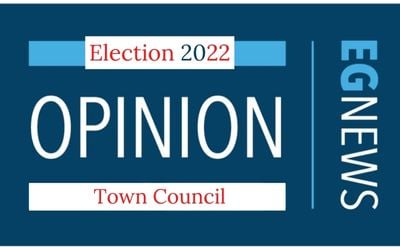Submissions are welcome – send to [email protected]. The last day to submit an opinion column (or letters to the editor) about the Nov. 8 election is Oct. 25, two weeks before election day (11/8).
By Brandon Salomon, Peter Rodgers and Brian Turner
This year, the Rhode Island General Assembly passed a package of 10 bills related to low- and moderate-income housing (LMIH) that were designed to “streamline development, provide more complete and timely information about housing, and help municipalities meet their affordable housing goals,” according to a July 5 press release. While the stated goal of increasing the “supply of affordable homes in Rhode Island to ensure that all Rhode Islanders have access to homes that are affordable to them in the community of their choice” is commendable, the practical results of these new laws take away local autonomy and have the potential to substantially overburden our town’s infrastructure and school system.
It is important that we not allow the state government to usurp local authority, as EG residents know what is best for the members of our community. Our residents don’t wish to prevent people who need affordable housing to be excluded from living here; they simply wish to have a say about whether 400+ vehicles are added to the daily traffic pattern near their homes and whether hundreds of students are enrolled in our already overcrowded schools with no plan to add more space beyond what is projected for the next five years. They wish to have more control over the environmental impact on water tables, wildlife, and an ever-diminishing green space. The East Greenwich Town Council should seek creative solutions to preserve the spirit of the affordable housing laws while fighting against state loopholes for contractors to exploit our desirable community for their profit and to the detriment of our infrastructure. They should advocate with the General Assembly to amend the laws. And they should publicly share their efforts with the community so that their constituents can provide feedback, which is their right as stakeholders.
The Rhode Island League of Cities and Towns does provide some advocacy on behalf of Town Councils statewide. In addition, we believe our Councilors should bring state and local attention to problems before they arise by being in regular dialogue with legislators by writing resolutions, or statements for the public record, in which they urge them to offer input in the language of the law and to vote in support of our town’s interest. This would send a proactive message to our state representative and senator about whether we support a bill that could negatively affect us. Ideally, before a law is passed, they should provide our lawmakers with specific ways in which they would like the law amended. We believe that there are several amendment opportunities to the law which could balance the need for affordable housing with the infrastructure necessary to support our residents.
Examining what nearby states are doing to provide more local control can serve as an important comparison. Connecticut has a similar statute known as the Affordable Housing Land Use Appeals Procedure, which allows housing developers to challenge a town’s refusal to approve their application even if it doesn’t conform to a town’s land-use guidelines. However, the law also provides a four year exemption from the developer’s right to an appeal if the town can show that it has added affordable housing equivalent to 2 percent of the current housing stock. According to Connecticut’s Office of Legislative Research, “A municipality is eligible for a four-year moratorium on appeals taken under the procedure each time it shows it has added affordable housing units, measured in HUE (housing unit equivalent) points, equaling the greater of 2 percent of the housing stock, as of the last census, or 75 HUE points.” For an explanation of HUE points, see https://cga.ct.gov/2017/rpt/pdf/2017-R-0013.pdf. This seems like a reasonable solution when a town can demonstrate that it is making progress in achieving its 10 percent goal.
A creative approach taken by Massachusetts is a program that provides a tax discount for homeowners who rent in-law apartments at below market value (https://patch.com/massachusetts/salem/salem-offers-grants-homeowners-renting-affordable-law-units). The Town of Salem also offers a grant program to aid in the construction of those units, which we believe would be a helpful resource if underwritten by the state. In this program, owners of “…accessory dwelling units – or so-called ‘in-law apartments’ – can apply for a grant up to $47,500 for the design and construction… along with benefiting [from] a state law that exempts the value of the ADU from property taxes, as long as they are renting the units well under what is considered fair market value.” These programs provide benefits for the homeowner, the people seeking affordable housing, and the town. And it allows for development to happen at a sensible pace that can keep up with the town’s infrastructure.
The laws could also be amended in other ways to change the definition of affordable housing. For example, the numerous mobile homes in our community do not qualify as affordable housing since they are not deed restricted. However, it can be argued that mobile homes fulfill the spirit of the law by providing families the opportunity to live in East Greenwich in an affordable dwelling. Furthermore, seniors who live in their homes, have paid off their mortgage in full, and are living on a fixed income could also qualify. Rather than counting their residence, which may be valued too high to count as “affordable,” the state could credit our town’s affordable housing percentage by allowing property tax incentives that adapt to the fixed income of senior members of the community, thereby keeping their existing home affordable and not forcing them out of the community. Finally, the laws should expand the considerations given to towns beyond just the health and safety of the community when a developer is seeking a bypass of the approval process. Whether the school system can adequately serve the incoming population should be paramount. And the General Assembly should provide enhanced school funding tied to the amount of affordable housing a town can accommodate.
We are aware that our Town Council has recently announced that it has approved the town’s purchase of some land in East Greenwich in order to preserve green space. This is laudable. Another creative solution the Town Council could explore is to purchase land specifically for the purpose of building 100 percent affordable housing so that we can reach the 10 percent mandate more quickly without placing an undue burden on our infrastructure. This brings with it the added benefit of regaining town autonomy for future development considerations. Newton, Mass., is an example of a municipality seeking to do so: https://www.newtonma.gov/home/showpublisheddocument/76925/637711284422500000. Affordable housing is deed restricted for 30 years, which removes the ability of a homeowner to sell their property at fair market value. If the town were to own some of the deed restricted properties, this concern would not apply since the town will exist in perpetuity and does not need to profit from a sale before the deed restriction runs out.
The Republican candidates for Town Council do not believe that “our hands are tied” as the current Town Council members do. We think that there are several, creative ideas that should be explored to fulfill the intent of the LMIH Laws while also allowing East Greenwich (and other cities and towns in RI) to do so in a manner that intelligently balances the town’s needs in a myriad of areas. They should write formal resolutions requesting that our elected officials at the state level draft legislation to adopt some of the best ideas and plans from other states to update and correct shortfalls in our current laws. Ultimately, we don’t need to race headlong to meet our 10 percent affordable housing goal. As candidate for District 30 Representative, Amanda Blau, stated in the candidate forum last week, “We don’t need to be the first, we need to be the best.”
Brandon Salomon, Peter Rodgers, and Brian Turner running for East Greenwich Town Council






 Subscribe
Subscribe
Thank you for this well researched article. I find it concerning that such a large development could be built without a well thought out plan for infrastructure to support such a community in our small town. How will the schools manage so many more students? What about the police and fire departments? Traffic? We are adding population to our small town so rapidly this really concerns me.
Thank you for such a thoughtful article. Did the existing Town Council work with Rep. Caldwell to oppose the law which is overriding out local zoning control? Did Rep. Caldwell even vote against it?
Ms. Caldwell voted in favor of all 11 affordable housing bills.
Thank you for the article. We chose East Greenwich after moving from California for our family from numerous options, primarily because it is great place to raise children with great schools with relatively low students to teacher ratio. This State legislation is very concerning. It forces changes in our community without a well thought out plan that truly is beneficial to the community as a whole and addresses infrastructure and over crowding in schools.
Finally people are thinking outside of the box. Research and not having blinders on and examining all options provide results for all. Where is the planning department in town? The south pierce Cora st project is in a flood zone, the liberty st union st project along with the brook side project is to congested ( not enough green space). We shouldn’t have to prove anything to the state. We need to help families live by having a flexible planning board for preexisting dwelling’s . Our current town council and state legislators are living in a bubble.
What is EG doing to preserve the right to farm in recorded subdivisions? Many of these subdivisions come along with zoning bylaws that supersede our right to farm and restrict the keeping of roosters, or growing of specific crops, etc. What can we do to ensure that the bylaws in recorded subdivisions do not supersede the rights that make East Greenwich so attractive? Also, how with this impact the environment, sustainability and affordability of quality produce and fresh farm products? Will an increase in recorded subdivisions create a larger carbon footprint for the import of goods into EG?
I think the in-law dwelling initiative is a good idea.